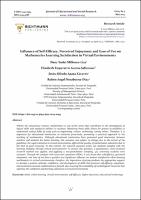| dc.contributor.author | Millones-Liza, Dany Yudet | |
| dc.contributor.author | García-Salirrosas, Elizabeth Emperatriz | |
| dc.contributor.author | Apaza-Cáceres, Jesús Alfredo | |
| dc.contributor.author | Norabuena-Diaz, Rubén Ángel | |
| dc.date.accessioned | 2024-07-31T16:54:38Z | |
| dc.date.available | 2024-07-31T16:54:38Z | |
| dc.date.issued | 2023 | |
| dc.identifier.uri | https://hdl.handle.net/20.500.13067/3293 | |
| dc.description.abstract | Within the educational context, mathematics is one of the areas that contributes to the development of logical skills and analytical abilities in students. Mastering these skills allows for greater accessibility to understand various fields of study such as engineering, science, technology, among others. Therefore, it is important for educational institutions to intervene proactively, promoting a practical approach in the teaching of mathematics. Although educational institutions have promoted good interaction between teachers and students for better learning, this situation was subject to change due to the arrival of the pandemic; the rapid transition to virtual environments affected the quality of mathematics education due to the lack of good resources. In this context, the research question arises: are students satisfied with the learning modality through virtual environments? To answer this question, a quantitative, cross-sectional research method was applied, and applying a non-probabilistic sampling, 402 university students were surveyed. Through the analysis with structural equations (SEM), it was found that self-efficacy, perceived enjoyment, and ease of use have a positive and significant influence on student satisfaction when learning mathematics in virtual environments; therefore, the importance of giving students the appropriate support to develop a positive attitude, confidence, and development of skills that promote self-efficacy, enjoyment, and motivation towards mathematics is framed, also ensuring the availability of technological resources that optimize the conditions and learning experience in virtual environments | es_PE |
| dc.format | application/pdf | es_PE |
| dc.language.iso | eng | es_PE |
| dc.publisher | Richtmann | es_PE |
| dc.rights | info:eu-repo/semantics/openAccess | es_PE |
| dc.rights.uri | https://creativecommons.org/licenses/by-nc/4.0/ | es_PE |
| dc.source | AUTONOMA | es_PE |
| dc.subject | Math | es_PE |
| dc.subject | Online learning | es_PE |
| dc.subject | Virtual environments | es_PE |
| dc.subject | Self-efficacy | es_PE |
| dc.subject | Higher education | es_PE |
| dc.subject | Educational technology | es_PE |
| dc.title | Influence of Self-Efficacy, Perceived Enjoyment and Ease of Use on Mathematics Learning Satisfaction in Virtual Environments | es_PE |
| dc.type | info:eu-repo/semantics/article | es_PE |
| dc.identifier.journal | Journal of Educational and Social Research | es_PE |
| dc.identifier.doi | https://doi.org/10.36941/jesr-2024-0054 | es_PE |
| dc.subject.ocde | https://purl.org/pe-repo/ocde/ford#5.02.04 | es_PE |
| dc.source.volume | 14 | es_PE |
| dc.source.issue | 3 | es_PE |
| dc.source.beginpage | 47 | es_PE |
| dc.source.endpage | 59 | es_PE |


